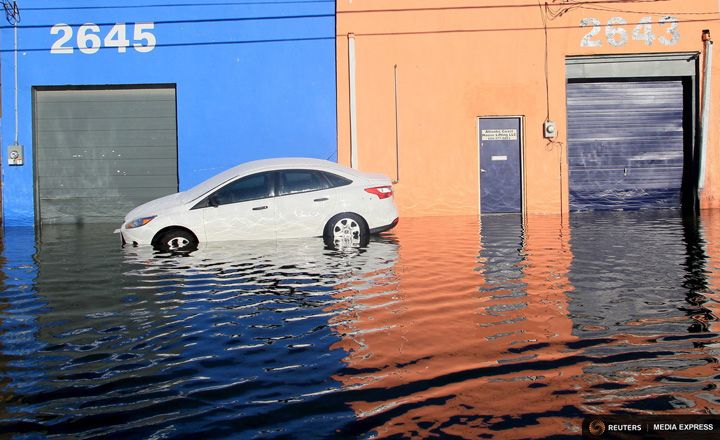Ocean Warming is Making Floods Worse
Published on by Naizam (Nai) Jaffer, Municipal Operations Manager (Water, Wastewater, Stormwater, Roads, & Parks) in Academic
Floodwaters that washed icy brine into streets and homes along the eastern seaboard during Saturday’s blizzard reached heights in some places not experienced since Hurricane Sandy.
“I just hope it isn’t a sign of things to come,” Pam Bross told a local newspaper as she mopped up the market she operates on a New Jersey street not normally reached by storm surges.
With tides and storm surges inching upward and inward, worsening floods are harbingers of even soggier times ahead. As the weekend’s winter storm hurtles across the Atlantic Ocean, bringing its flood risks to Europe, new research is pointing to an outsized role that ocean warming has been playing in raising sea levels — a problem normally associated with melting land ice.
Water expands as it heats up, and oceans have been absorbing most of the heat trapped by greenhouse gases released by fossil fuel burning, deforestation and animal farming. A new study blames expansion of warming waters for as much sea level rise from 2002 through 2014 as the melting of all the glaciers and the Greenland and Antarctic ice sheets combined.
“Satellite observations show that sea level rise over the last decade is explained, by about 50 percent, by thermal expansion,” said Roelof Rietbroek of the University of Bonn, who led the research, which was published Monday in Proceedings of the National Academy of Sciences.
The team of scientists led by Rietbroek concluded that thermal expansion caused seas to rise globally during the 12 years studied by about two-thirds of an inch, with ice melt and other factors contributing to an overall rise of twice that amount.
Currents, winds, ocean cycles and other factors meant the effects were felt differently in different parts of the world. The East Coast and parts of Asia experienced rapid sea level rise during the study period, while the West Coast saw sea levels drop slightly — albeit temporarily.
Rietbroek said the new findings regarding rapid thermal expansion are encountering “pushback” from some scientists. But he said they’re consistent with models that some thought were overestimating thermal expansion in warming oceans.
Attached link
http://www.climatecentral.org/news/rapid-ocean-warming-making-floods-worse-19955?utm_content=buffer2e0a2&utm_medium=social&utm_source=twitter.com&utm_campaign=bufferTaxonomy
- Research
- Environment
- Glacier
- Hydrology
2 Comments
-
We Must Ponder On
§ 56 acres of Planet’s forests destroyed every minute
§ Half of Planet’s wildlife species lost last 40 years
§ Mammals, birds, reptiles, amphibians, fish declined 52%
§ Freshwater species decreased by an alarming 76 percent
§ Water and food are interdependent
§ One litre of water to produce one calorie of food
§ We will fail to feed the world until we fix the water crisis
§ The world’s thirst for water will grow by 50%. By 2030
No matter Climate Changing or not, Ice melting or not we must need less consuming mind - sasrai.com
-
Care for Nature, Resource is Utmost
No matter Climate Changing or not,
Ice melting or not – may be disputed
But none to dispute on
Vital Ingredient for Life -
Resources Running Out Rapidly.
Earth demand Vibrant step, sasrai
Caring and Less consuming mind
sasrai.com